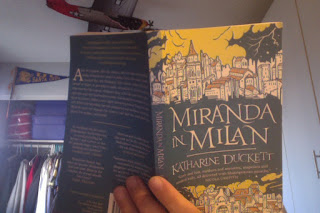Lucas Blogs About Miranda in Milan
 |
| Huh, I never knew that Prospero was the Duke of Milan, IL. |
So, what's this book's deal?
Well! I'm glad you asked, Hypothetical Reader.
You're glad I asked the question I ask at the start of every post?
. . . yes. Anyway, this book's deal is that it's a sequel to Shakespeare's The Tempest written by Katharine Duckett.
Didn't you already cover something like this?
No, that was an adaptation. This picks up the story where the play leaves off. Well, let's say a few weeks after the play leaves off. So, we all remember that the play ends with Miranda happily married to Ferdinand, the prince of Naples, and Prospero giving up magic and taking his rightful place as the Duke of Milan.
. . . uh, yeah, we all definitely remember that.
Oh, good, I was worried I'd have to explain it. Anyway, this book starts off with Miranda cloistered away in her rooms in the ducal palace in Milan.
Wait, why's she in Milan, shouldn't she be with her husband in Naples?
Yeah, probably, but Prospero has taken her to Milan. Anyway, she's forced to hide her face away by her aunt Agata, and no one will speak to her except for her serving girl, Dorothea. Over time, she and Dorothea grow closer and Miranda begins sneaking out of her room at night. In her wonderings she finds her uncle Antonio in chains, and begins to suspect that maybe her father isn't doing such a good job at quitting magic cold turkey. She also finds herself drawn to the charismatic Dorothea who claims to be a witch and promises to help her navigate the goings on in the palace.
Wait, is this one of those, "What [insert classic literary protagonist] were a bad guy?" stories.
Yeah. Although, isn't it usually, "What if [insert classic literary antagonist] weren't really a bad guy?"
I will concede your point.
Anyway, this is a fun, breezy fantasy/horror/romance novel. There's not a lot of plot here, but there's lots of atmosphere. Duckett makes the ducal palace into a sort of gothic prison for Miranda. In fact, it's kinda like if you were reading an actual Gothic novel, but the twist was that the supernatural elements of the story were actually supernatural.
Like a reverse Scooby-Doo?
Hmm, I think Meddling Kids was more of a reverse Scooby-Doo.
Please don't remind me.
Sorry. Let's get back to Miranda in Milan.
Yes, let's. So, you said that there's not a lot of plot?
Correct. But I don't mean that as a dig. This is more of a character piece about Miranda trying to find her place in the "brave new world," (ironically, the Old World) that she set off for at the end of the Tempest, and being frustrated to find that maybe she doesn't have a place in it. When she meets Dorothea, she's afraid and isolated, and Dorothea is the first person who reaches out to her and tries to help her work through her feelings. This is partly because Dorothea isn't really a Dorothea at all. She knows a thing or two about not fitting in becasue she's actually named Duriya and is a Moorish woman who can pass for Italian hiding out from the Spanish Inquisition.
There was no such country as "Italy" back then.
That's your takeaway?
Sorry, couldn't resist. So then I take it that the romance you mentioned earlier is between Miranda and Dorothea? Wouldn't that call the ending of The Tempest into question?
That's kinda the point of the book. But I wouldn't say that it's such a big departure from Shakespeare's play. After all, one of the reasons Miranda falls in love with Ferdinand is that he's the first man she's ever seen who isn't her father, her attempted rapist, or a spirit. Miranda's attraction to Dorothea isn't even the only way that Duckett tweaks the source material, she also calls attention to Prospero's cruelty to Caliban and Ariel, and the way that both of those characters are presented to the audience. As I mentioned in that Forbidden Planet Oddaptations, a modern audience might deem Shakespeare's treatment of interactions between Europeans and characters coded as indigenous to be what I am given to understand the young people refer to as a "YIKES!"
You're kind of making it sound like the author is dunking on William Shakespeare for having the biases that any Elizabethan playwright would have.
The Tempest was first written and performed in the Jacobean era.
That's your takeaway?
Sorry. That definitely isn't my read. It's clearly a love letter to the works of William Shakespeare. It's got magic, cross-dressing, schemes, counter-schemes, a plot that hinges on the lengthy revelation of some past wrong. . . And sure, it asks the reader to look at the play from a different angle, but if it didn't, what would the point be in continuing the story? If we accept the play as presented then the story is over. And it isn't like this book will erase The Tempest. It's an interesting companion peace. A sort of What if . . . ?
Well, that's does make it sound pretty fun.
It is pretty fun, and short. You could read it in an afternoon or two. Like I said, creepy atmosphere aside, Duckett plainly wants you to have fun while reading this. If it doesn't sound like your jam, you're free to ignore it. However, I'd say it's worth a read.
Miranda in Milan by Katherine Duckett, Tor Books trade paperback edition, March 2019, 200 pages, pairs well with secret nighttime wanderings and rethinking major life decisions
Links:
Here's the author's website, if you're into that kinda thing.
If you're still not sure if this something you're interested in, you can read the first chapter now on io9.
Comments
Post a Comment